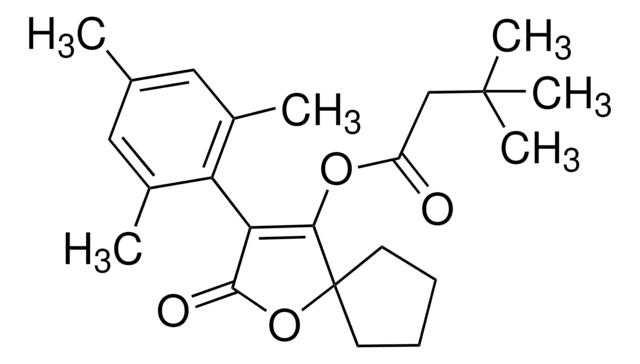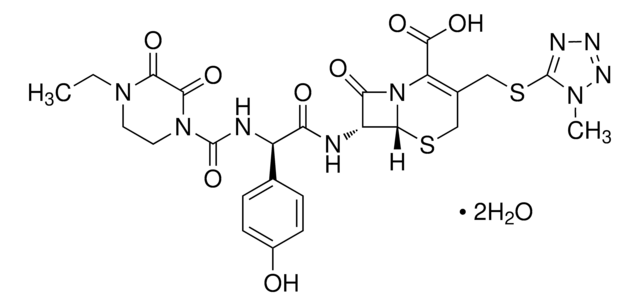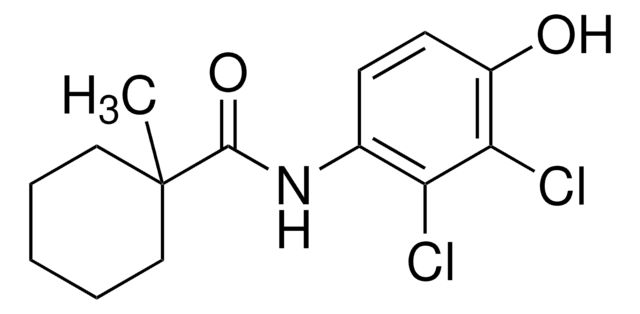CRM03908
Spirodiclofen
certified reference material, TraceCERT®, Manufactured by: Sigma-Aldrich Production GmbH, Switzerland
Synonyme(s) :
3-(2,4-Dichlorophenyl)-2-oxo-1-oxaspiro[4.5]dec-3-en-4-yl) 2,2-dimethylbutyrate
About This Item
Produits recommandés
Qualité
certified reference material
TraceCERT®
Niveau de qualité
Gamme de produits
TraceCERT®
Forme
powder
Durée de conservation
limited shelf life, expiry date on the label
Fabricant/nom de marque
Manufactured by: Sigma-Aldrich Production GmbH, Switzerland
Chaîne SMILES
CCC(C)(C)C(=O)OC1=C(C(=O)OC12CCCCC2)c3ccc(Cl)cc3Cl
InChI
1S/C21H24Cl2O4/c1-4-20(2,3)19(25)26-17-16(14-9-8-13(22)12-15(14)23)18(24)27-21(17)10-6-5-7-11-21/h8-9,12H,4-7,10-11H2,1-3H3
Clé InChI
DTDSAWVUFPGDMX-UHFFFAOYSA-N
Vous recherchez des produits similaires ? Visite Guide de comparaison des produits
Description générale
Spirodiclofen is a selective, non-systemic acaricide belonging to the new family of spirocyclic tetronic acids (keto-enols). It is highly active against spider mites, such as Panonychus, Tetranychus, Phyllocoptruta, Brevipalpus, and Aculus species in citrus, pome fruits, grapes, and nuts. Spirodiclofen targets lipid biosynthesis by inhibiting acetyl-coenzyme A carboxylase (ACCase) and it effectively controls the population of mites resistant to other acaricides.
Spirodiclofen has to be monitored in the Multiannual Control Programmes for Pesticides Residues (MACP), run within the EU and EFTA in/on products of plant origin. Maximum residue levels (MRLs) have been set according to Reg (EG) No 2016/1902 for spirodiclofen for various products of plant and animal origin from 0.004 to 2 mg/kg.
Spirodiclofen was initially included in Annex I to Directive 91/414/EEC on 1 August 2010 and is approved under Regulation (EC) No 1107/2009, following Commission Implementing Regulation (EU) No 540/2011. However, after its approval expired on 31 July 2020, Spirodiclofen is no longer approved in the European Union (EU) but is authorized in third countries for use on citrus fruits that might be fed to livestock.
Application
- Study the molecular mechanisms of spirodiclofen resistance using two highly resistant Tetranychus urticae strains with different genetic backgrounds
- To evaluate the sublethal effects of spirodiclofen, abamectin, and pyridaben on life-history traits and life-table parameters of two-spotted spider mites, Tetranychus urticae
- To evaluate the effect of a combination of spirodiclofen with other insecticides for the control of Brevipalpus yothersi in citrus
- Investigate the effects of salicylic acid treatment of tomato plants on the susceptibility of Tetranychus urticae to spirodiclofen, the activities of mite digestive enzymes, and its energy reserves
- Simultaneous determination of spirodiclofen, spiromesifen, and spirotetramat and their metabolites in edible fungi using a modified QuEChERS procedure and UHPLC-MS/MS
Produits recommandés
Informations légales
Mention d'avertissement
Danger
Mentions de danger
Conseils de prudence
Classification des risques
Aquatic Chronic 1 - Carc. 1B - Repr. 2 - Skin Sens. 1B - STOT RE 2
Code de la classe de stockage
6.1C - Combustible acute toxic Cat.3 / toxic compounds or compounds which causing chronic effects
Classe de danger pour l'eau (WGK)
WGK 2
Point d'éclair (°F)
Not applicable
Point d'éclair (°C)
Not applicable
Faites votre choix parmi les versions les plus récentes :
Certificats d'analyse (COA)
Vous ne trouvez pas la bonne version ?
Si vous avez besoin d'une version particulière, vous pouvez rechercher un certificat spécifique par le numéro de lot.
Déjà en possession de ce produit ?
Retrouvez la documentation relative aux produits que vous avez récemment achetés dans la Bibliothèque de documents.
Notre équipe de scientifiques dispose d'une expérience dans tous les secteurs de la recherche, notamment en sciences de la vie, science des matériaux, synthèse chimique, chromatographie, analyse et dans de nombreux autres domaines..
Contacter notre Service technique











